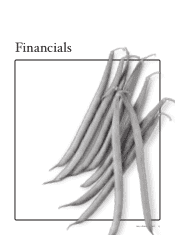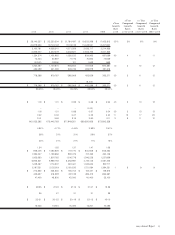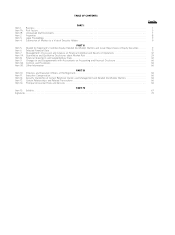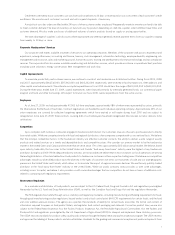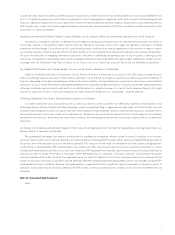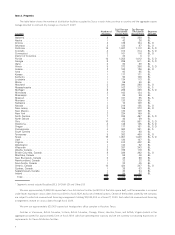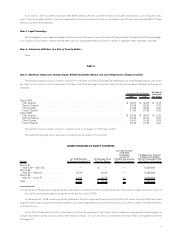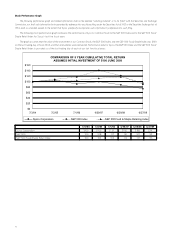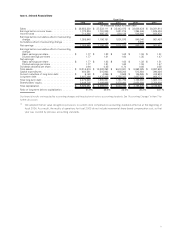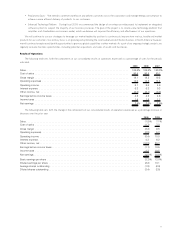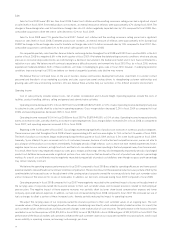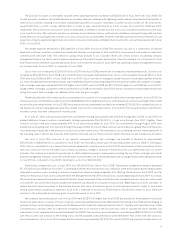Sysco 2009 Annual Report Download - page 25
Download and view the complete annual report
Please find page 25 of the 2009 Sysco annual report below. You can navigate through the pages in the report by either clicking on the pages listed below, or by using the keyword search tool below to find specific information within the annual report.Item 1A. Risk Factors
Deteriorating Economic Conditions and Heightened Uncertainty in the Financial Markets are Affecting Consumer Confidence, which is Currently
Adversely Impacting our Business and We Expect These Conditions to Continue
The foodservice distribution industry is characterized by relatively high inventory turnover with relatively low profit margins and the foodservice
industry is sensitive to national and regional economic conditions. The deteriorating economic conditions and heightened uncertainty in the financial
markets continue to negatively affect consumer confidence and discretionary spending. This has led to reductions in the frequency of dining out and
the amount spent by consumers for food prepared away from home. These conditions have, in turn, negatively impacted our sales, as noted by our
declining sequential sales trend each quarter from a positive 8.5% in the first quarter of fiscal 2008 to a negative 6.6% in the fourth quarter of fiscal
2009, and have also negatively impacted our operating results for fiscal 2009. If these conditions do not improve, there will continue to be a negative
impact on our operating results.
Increases in Fuel Costs and Inflation Affect our Costs and We May Not Be Able to Compensate for Increases in Such Costs
Volatile fuel prices and food costs have affected our industry during fiscal 2009.The cost of fuel affects the price paid by us for products as well
as the costs incurred by us to deliver products to our customers. Although we have been able to pass along a portion of increased fuel costs to our
customers, there is no guarantee that we can do so again if another period of high fuel costs occurs. In addition, prolonged periods of product cost
inflation may have a negative impact on our profit margins and earnings to the extent that we are unable to pass on such product cost increases. Our
estimate for the inflation in Sysco’s cost of goods was 4.7% in fiscal 2009, compared to 6.0% in fiscal 2008 and 3.4% in fiscal 2007. If fuel costs and
product costs increase again in the future, we may experience difficulties in passing all or a portion of these costs along to our customers, which may
have a negative impact on our business and our profitability.
Conditions Beyond our Control can Interrupt our Supplies and Increase our Product Costs
We obtain substantially all of our foodservice and related products from third party suppliers. For the most part, we do not have long-term
contracts with our suppliers committing them to provide products to us. Although our purchasing volume can provide leverage when dealing with
suppliers, suppliers may not provide the foodservice products and supplies needed by us in the quantities and at the prices requested. We are also
subject to delays caused by interruption in production and increases in product costs based on conditions outside of our control. These conditions
include work slowdowns, work interruptions, strikes or other job actions by employees of suppliers, weather, crop conditions, transportation
interruptions, unavailability of fuel or increases in fuel costs, competitive demands and natural disasters or other catastrophic events (including, but
not limited to food-borne illnesses). Our inability to obtain adequate supplies of foodservice and related products as a result of any of the foregoing
factors or otherwise could mean that we could not fulfill our obligations to customers, and customers may turn to other distributors.
We Need Access to Borrowed Funds in Order to Grow and Any Default by Us Under our Indebtedness Could Have a Material Adverse Impact
Because a substantial part of our growth historically has been the result of acquisitions and capital expansion, our continued growth depends, in
large part, on our ability to continue this expansion. As a result, our inability to finance acquisitions and capital expenditures through borrowed funds
could restrict our ability to expand. Moreover, any default under the documents governing our indebtedness could have a significant adverse effect
on our cash flows, as well as the market value of our common stock.
Product Liability Claims Could Materially Impact our Business
We, like any other seller of food, face the risk of exposure to product liability claims in the event that the use of products sold by Sysco causes
injury or illness. With respect to product liability claims, we believe we have sufficient primary or excess umbrella liability insurance. However, this
insurance may not continue to be available at a reasonable cost or, if available, may not be adequate to cover all of our liabilities. We generally seek
contractual indemnification and insurance coverage from parties supplying our products, but this indemnification or insurance coverage is limited, as
a practical matter, to the creditworthiness of the indemnifying party and the insured limits of any insurance provided by suppliers. If Sysco does not
have adequate insurance or contractual indemnification available, product liability relating to defective products could materially reduce our net
earnings and earnings per share.
Adverse Publicity about us or Lack of Confidence in our Products Could Negatively Impact our Reputation and Reduce Earnings
Maintaining a good reputation and public confidence in the safety of the products we distribute is critical to our business, particularly to selling
Sysco Brand products. Anything that damages that reputation or the public’s confidence in our products, whether or not justified, including adverse
publicity about the quality, safety or integrity of our products, could quickly affect our revenues and profits. Reports, whether true or not, of food-
borne illnesses, such as e-coli, avian flu, bovine spongiform encephalopathy, hepatitis A, trichinosis or salmonella, and injuries caused by food
tampering could also severely injure our reputation or negatively impact the public’s confidence in our products. If patrons of our restaurant
customers become ill from food-borne illnesses, our customers could be forced to temporarily close restaurant locations and our sales and
profitability would be correspondingly decreased. In addition, instances of food-borne illnesses or food tampering or other health concerns, such as
flu epidemics or other pandemics, even those unrelated to the use of Sysco products, or public concern regarding the safety of our products, can
result in negative publicity about the food service distribution industry and cause our sales and profitability to decrease dramatically.
5


